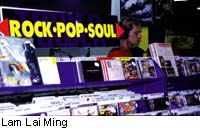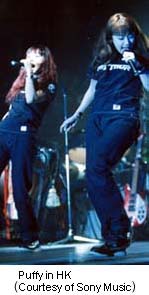December 1998Art as a CommodityThe operation of CD storesBy Joey Yu and Lam Lai Ming
The Tower Records Group USA was the first store of this kind that recognized Hong Kong's market potential. In 1993, Tower Records became the first local 'music supermarket'. Subsequently, HMV (His Master's Voice) Media Hong Kong CD Limited, a subsidiary of the EMI Group in the U.K., was launched in 1994. At present, it is the largest record retailer in Hong Kong, in terms of the number and area of its outlets. Despite their relatively expensive merchandise, the two retailers are confident of their businesses. "The prices of our merchandise are reasonable," said Miss Portia Chung, the advertising and promotion manager of Tower Records, "with regard to the high-quality services we provide." With the tag line 'Music At Its Best', the HMV Group says that it offers the best for the money it receives. Tower Records and the HMV Group attribute their success to the facilities they provide. "I often kill time at the listening posts," said Yvonne Tam, the sales coordinator of a trading company, "They help me go through the CDs I am interested in.
"The user-friendly cataloguing system enables me to search for CDs in a convenient way," said Lau Tin Ming, a student of the University of Hong Kong. "DJ booths and huge video walls with live broadcasts can expose shoppers to a wide range of international music," he said. "Besides improving their services, the two stores boost their sales through other promotional strategies. "Coupons for special events are available only in our stores. Those who want to participate have to buy CDs from us," said Miss Chung. Other strategies like CD coupons, tied-items and lucky draws are also adopted. Furthermore, Miss Chung believes that one great merit of chain stores is that they provide more choices for customers. Lau Tin Ming, a customer, shared the same view. "I think that large record stores have broadened the music horizon of the local audience by presenting different types of music," said he. But although there are ways to enhance sales, the prospect of the business is not always bright. The recent economic downturn has dealt a severe blow to the business. The banning of parallel imports makes things even worse. Under the Copyright Ordinance, overseas CDs may not be imported into the territory within 18 months of their first publications, or they would be regarded as infringing copyright. Those who sell infringing copyright are subject to a maximum fine of HK$ 50,000 per copy and 4 years' imprisonment. "Buying overseas CDs from local companies increases the cost of our merchandise," said Miss Chung of Tower Records, "It also costs us too much time."
"In the past we could earn up to $1,000 everyday but now we are making losses," he said. Mr. Ken Ng, the shopkeeper of a CD shop in Sino Center, shared this view. He said that the turnover had dropped by 30% early this year, due to the poor economy. He said that high rent also damaged the business. In the past slashes on prices were good for business, but not for now since the profit would be too low. "For example, we gain only $1 per sale of Faye Wong's CDs, and $2 from both Leon Lai's and William So's CDs. Owners of independent shops also believe that the Copyright Ordinance threatens them. Ms Lau Tse-yan is the shopkeeper of a CD shop selling mainly parallel imported CDs. She believes that parallel imports are necessary, as there is no wholesaler for some uncommon CDs. Furthermore, the wholesale prices are too high for CD shops and there are only a few distributors in Hong Kong. The cost depends on mutual friendship; that is, whether the retailers pay on time and whether they order a large quantity. Therefore it is hard to find cheap CD sources. In order to survive, shop owners may adopt some rarely known methods to obtain cheaper CDs for sale. Shop owners may acquire 'mouse goods', according to Mr. Leung. Said he: "Shopkeepers may be associated with drug addicts or pickpockets to get CDs illegally. They would hand the stolen CDs to the corresponding record companies and complain about their quality. "Although the companies keep the records of ordering, the records are so complicated that they cannot be checked completely. As a result, these retailers may get new CDs from record companies for sale." In addition, according to Mr. Siu, second-hand CDs may be repackaged and put on sale. Some CD shopkeepers order CDs through the Internet. But since postage and handling fee are charged, the prices are still hardly affordable. Another threat to the business is pirated CDs. Mr. Leung thinks that it is impossible for copyrighted CDs to compete with the pirated ones, which are much cheaper. Shops selling pirated CDs could reopen again in the afternoon after a raid by the Customs and Excise Department in the morning. "The government has to get rid of piracy, otherwise our shop will be closed sooner or later," Mr. Leung lamented. With regard to competition from CD chain stores such as HMV and Tower Records, many independent shop owners deny its significance. "Competition mainly comes from piracy and other small shops. The chain stores' threat is smaller since they are located in certain areas only and their merchandise is more expensive," said Mr. Leung. An anonymous CD shop owner thinks that all CD stores, including chain stores, alternative shops and second-hand shops, can have a share in Hong Kong's market. None of them can be predominant. The Music Colony Biweekly's chief editor, Mr. Yeung Chi-chung, suggests reasons why the CD business is declining. He thinks that the Copyright Ordinance hinders the availability of alternative CDs in Hong Kong. He also suggests that, to uphold the business, it is important to get rid of pirated copies completely. Another reason he suggests is that people do not respect music. "They think that CDs and music are not worth much," he said.
Opening the Doors of MusicBy Janice Wong
Said he: "Hong Kong is a small market, which is impossible to accommodate a large number of artists from every corner of the world. "Singers' popularity and reputations in overseas are not the key points. What matters is whether they fit the local market." Mr. Raymond Leung, promotion manager of Warner Music Entertainment (HK) Limited, said there are two kinds of tours, one is promote tour and the other is concert tour. The former is organised by music entertainment companies for promoting foreign artists and their songs in Hong Kong. Said Mr. Raymond Leung: "We are responsible for their itinerary, including air tickets, accommodation and arrangements to get exposure through mass media. Apart from manipulating press conference, music programmes on TV and radio, we also arrange the artists to perform in special events such as beauty contests and charity shows. T-shirts and posters with autographs and mini-concerts are by products of promotional strategy. Fans get free gifts by buying CDs, wining question-and-answer games on radio programmes or just by lucky draw. Differing from promote tour, concert tour is organised by production companies, the so-called 'promoters'. They aim at making profit. "Usually only those who are very popular can hold concerts in the territory, like Oasis,' said Mr. William Yu. Music entertainment companies usually make joint promotion with promoters. Mr. William Yu explained, "The successes of concerts raise the sales of discs. On the other hand, promoters depend on our good relationship with the local media." Organising such tours is no easy task. Mr. Raymond Leung said artists might not understand the way of promotion in Hong Kong. He had to explain why playing games in TV shows is a part of their jobs. Added he: "We encounter more difficulty after the financial crisis. Sponsors may not bear the marketing budget now." When asked the potential of international music in Hong Kong, Mr. William Yu says that the market is limited as English is the second language and the population is small in Hong Kong. Mr. Raymond Leung, however, is optimistic about the market. He expects the CD retailing business to come round soon, as well as the local economy. No matter how the market grows, it is with little doubt that music lovers prefer more international music.
|
Back to Contents
 The early '90s was a thriving period for Hong
Kong's record retailing business. A good piece of evidence was the sprouting
of two worldwide CD megastores.
The early '90s was a thriving period for Hong
Kong's record retailing business. A good piece of evidence was the sprouting
of two worldwide CD megastores. "DJ booths with live broadcasts create a nice
atmosphere in the shops," she said.
"DJ booths with live broadcasts create a nice
atmosphere in the shops," she said. Nowadays running a CD megastore is hard. Running an
independent CD shop is not easy either, as suggested by Mr. Danny Leung, a
salesman of a Canto-pop CD shop in Mongkok.
Nowadays running a CD megastore is hard. Running an
independent CD shop is not easy either, as suggested by Mr. Danny Leung, a
salesman of a Canto-pop CD shop in Mongkok. According to Mr. William Yu, promotion manager of
Sony Music Entertainment (HK) Limited, in average there comes an overseas
artist every month.
According to Mr. William Yu, promotion manager of
Sony Music Entertainment (HK) Limited, in average there comes an overseas
artist every month.